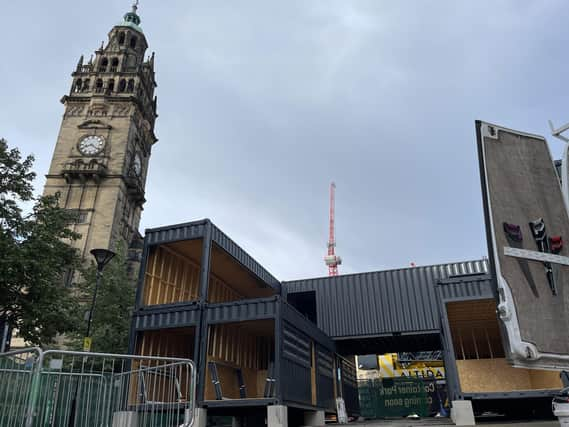Questions about ‘failed’ Fargate Container project unanswered in fiery debate


Last week, Sheffield City Council released an independent report that revealed “significant procedural and control failures” over the project which aimed to get people into the city, with the containers used for eating, drinking and entertainment spaces.
But in the year since news first broke of the plans, the project saw a sewage scare, delays after delays, disagreements, vendors pulling out, low footfall, and the bar never being completed, as costs and negative press mounted.
Advertisement
Hide AdAdvertisement
Hide AdIn January this year, councillors on the strategy and resources committee voted to kill the project completely and give the containers to community groups.
The report was (about to be) discussed at the council’s audit and standards committee yesterday (November 23) but members found out that many questions would go unanswered as they hit out at “literally everything going wrong” and “losing hundreds of thousands of pounds”.
When talking about the internal audit, Cllr Simon Clement-Jones (Beauchief and Greenhill, Liberal Democrats) said one of the things he would have liked to see was “the context around the politics or the politicians at that time”.
He said it was important “we knew why this happened”.
Cllr Clement-Jones added: “We’ve got some of the ‘what happened’ but we know next to nothing about the ‘how’ or ‘why’.
Advertisement
Hide AdAdvertisement
Hide AdHe went on asking “why and how did officers get this so wrong”.
He also asked about the “pressure” that “made them do this”.
Cllr Clement-Jones said: “What it looks like to me is politicians desperate for a quick win on the town centre putting pressure on officers who then go away and do something like this.”
He added people had asked him if it was “fraud”.
He said opposition councillors who raised issues with the project were “ignored by officers” and “belittled by politicians”.
Advertisement
Hide AdAdvertisement
Hide AdDavid Hollis, general counsel and monitoring officer, told the committee that Cllr Clement-Jones had raised matters (political pressure, for one) that were not covered by the report so “that’s why there isn’t an answer to those”.
Cllr Clement-Jones told Mr Hollis and the committee that this was their only opportunity to discuss this report in the foreseeable future and “these questions will go unanswered”.
He said: “We’ve read the report and we have questions, and we deserve answers.
“I don’t understand why because it’s not written in the report that I can’t ask for further information.
“It is the duty of the audit committee to ask questions.”
Advertisement
Hide AdAdvertisement
Hide AdCllr Fran Belbin (Firth Park, Labour and Co-operative, Deputy Leader of the Council) said looking back at the paperwork she could see “very little evidence that there were any risk controls in place”.
When it was raised that in the internal audit, “there was no mention of accountability of officers and politicians”, the Audit and Standards Committee was told that “an additional deep dive has been requested” and it was already underway.
Cllr Mohammed Mahroof (Graves Park, Liberal Democrats, Chair of the Audit and Standards Committee) said the report “just does not read well at all” and he wanted answers so he recommended to widen the scope and “it needs to be brought back here”.
Cllr Mahroof added: “We don’t agree with the recommendations (set out in the report), that is for sure.
Advertisement
Hide AdAdvertisement
Hide Ad“Literally everything went wrong. There has to be somebody or some people to allow this to happen.
“We can’t sit here and say ‘right, we got it all wrong, learned from some mistakes there, we’re getting sorted it out, and that should be fine.
“We lost hundreds of thousands of pounds…”
Members were called not to engage in scrutiny – audit and scrutiny should not be combined.
Mr Hollis said: “We need to ensure that what we’re not doing is moving into a scrutiny role within this committee.”
Advertisement
Hide AdAdvertisement
Hide AdCllr Clement-Jones told him that “this committee doesn’t see that scrutiny happening anywhere else”.
The auditors – whose purpose was to provide an independent opinion and identify areas where controls were operating poorly or where controls were not in place – have found that the construction had failed as the usual and defined procurement process was not followed, nor were contract variations documented.
In the report, they stated: “Project management practices were not followed and more worryingly formal financial and contractor monitoring throughout the work was poor or non-existent, furthermore, no risk management was in place.
“The lack of controls and poor governance arrangements led to poor decision making and ultimately the project did not succeed.
Advertisement
Hide AdAdvertisement
Hide Ad“When trying to ascertain the reasons for this project failure, it emerged that the head of service (who took on the de facto lead role on the work), did not have dedicated specialist skills, support and resource.
“The council’s specialist project management teams were not fully or formally involved, but only called upon using an ‘ad-hoc’ approach.”